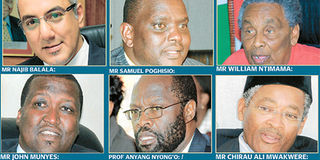Ministers flout the rules over State jobs

What you need to know:
- Trend grows rampant as politicians use powerful offices to reward their cronies
Cabinet ministers are blatantly flouting rules governing appointment of parastatal heads in a trend that has exposed how confusion and absence of clear lines of command in the coalition government are beginning to take a toll on administration of the public sector.
The Nation can now reveal how some ministers have filled the ranks of the public sector bureaucracy with cronies and political allies — without reference to the boards of those organisations thereby circumventing the regulation that requires that chief executives be appointed through competitive bidding.
Under the State Corporations Act, a minister is required to appoint a parastatal chief from a list of three names identified under a competitive process by the board.
But some ministers have been hand-picking their cronies and tribesmen and appointing them to plum positions even where they do not possess the required qualifications.
Investigations by the Nation have revealed how more than 10 parastatal heads have been appointed over the last one year in total disregard of the rules.
In one such a case, Medical Services minister Anyang’ Nyong’o disregarded recommendations from the board of the Kenya Medical Training College (KMTC) asking him to renew the contract of immediate former director Dr Timothy King’ondu.
The board, chaired by Prof James Kahindi, had written to the ministry four months ahead of the expiry of Dr Kig’ondu’s contract requesting that he be retained.
According to correspondence seen by the Nation, Prof Kahindi asked the ministry to have the director’s contract renewed on grounds that during his three year-term, the college “had initiated a lot of expansion programmes aimed at increasing the capacity”.
Prof Kahindi asked the ministry to start the process of either renewing or getting a new chief executive to start immediately to ensure a smooth management of the institution and orderly succession planning.
But in a letter on March 27, 2009, the ministry said it had decided not to extend Dr King’ondu’s contract.
The PS directed the board to immediately advertise the position and identify three candidates from whom the minister will pick one.
On Monday, Prof Nyong’o said the post had been advertised and will be filled after competitive interviews.
At the NGO Co-ordination Board, the board’s recommendation that chief executive David Isoe’s term be renewed was also rejected by National Heritage minister William ole Ntimama.
Mr Ntimama appointed former permanent secretary Peter ole Nkuraiya to the seat at the eleventh hour.
The organisation’s board had written to the board in November last year — four months before the expiry of Mr Isoe’s contract — asking that he be reappointed.
Contacted on Monday, Mr Isoe said his exit was most unexpected since he had been made to believe that the board’s decision was an endorsement of his work. Mr Ntimama was not available for comment.
At the newly-formed parastatal, Kenya Year Book Editorial Board, Information minister Samuel Poghisio appointed his ally Dennis Chebitwei to the chief executive’s position without advertising the position. Mr Poghisio could not be reached to comment on the appointment.
Only two weeks ago, Tourism minister Najib Balala appointed his personal political adviser Kenneth Ombongi to head the Kenya Utalii College without going the path of competitive recruitment.
Dr Ombongi was plucked out of the lecturer hall at the University of Nairobi where he was a history lecturer and many critics argue he has little to do with management and knowledge of the hospitality industry to turn around the tattered institution.
Last week, Mr Balala said he saw nothing wrong with appointing a friend because that was the practice now in government.
On Monday, Dr Ombongi said he was qualified for the job and would get it “even if it was competitively sourced”.
“There should be no question of me being a friend of the anyone since I am a Kenyan who is qualified for this job,” said Dr Ombongi, 40.
Mr Balala said he appointed Dr Ombongi in an acting capacity following a report of a task force that recommended radical measures to restore the glory of the institution.
Recently, the reappointment of George Muhoho as Kenya Airports Authority managing director brought to the fore the disrespect of government hiring rules.
Although the KAA board wanted Mr Muhoho’s tenure ended, Transport minister Chirau Mwakwere shrugged that aside and handed him back the position to the chagrin of many.
Mr Mwakwere on Monday said he reappointed Mr Muhoho because he has done an outstanding job during his time in office.
“His job satisfied me. He has transformed the Kenya Airports Authority,” he said.
In September, Labour minister John Munyes sacked the then NSSF managing trustee Rachael Lumbasyo, a move that was condemned as unprocedural.
Although the minister has powers to appoint the Fund’s chief executive, the procedures to be followed are clearly stated in the NSSF Act, Cap 258, which requires the minister appoint based on the Board of Trustees’ recommendations.
The government is aware of the abuse of the rules. “In certain cases, the application of the clause has been done in such a way that it is seen as a contradiction of the government policy on competitive sourcing,” said Mr Muthaura in a circular.
Public Service chairman Titus Gateere said the rules were an attempt to remove “cronyism and favouritism” in appointment to State corporations.
“Kenyans need to know which jobs fall vacant through advertisements, which they can then apply for if they are qualified,” he said.
Additional reporting by Kenneth Ogosia




